Using fabric softener is one of those laundry rituals that some people do and others don’t. If you do use it, there’s no denying the benefits that fabric softener has on clothes. But there are also negatives to using it that stem from some of the chemicals found in fabric softener. If you’ve run out of fabric softener or are just looking to switch to a better alternative, here are my suggestions for eco-friendly options.
Whether you prefer liquid or powdered fabric softener or dryer sheets, there are alternatives out there that contain fewer chemicals and are more eco-friendly. Liquid alternatives include vinegar and a hair conditioner. Powdered alternatives include baking soda and epsom salt. Lastly, dryer balls are a great reusable substitute for dryer sheets.
In this article, I’ll give you my recommendations for 12 of the best eco-friendly alternatives to fabric softener that are just as effective and don’t contain harsh chemicals. For each alternative, I’ll also talk about how to use it and the pros and cons of each so that you can decide which one best suits your laundry needs.
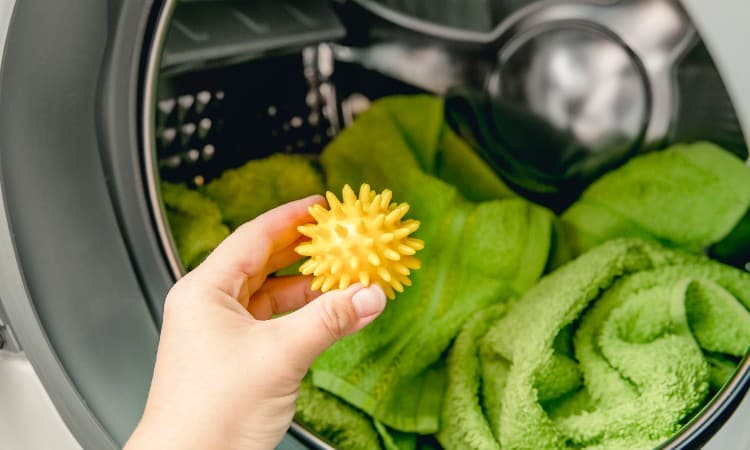
What Does Fabric Softener Do?
Fabric softener is a laundry additive that has many benefits for your clothes. Not only does it help to soften the clothing fibers, but it also reduces static and can make your clothes smell good as well. Fabric softener comes in three forms; liquid and powder fabric softeners are added to the washing machine, while dryer sheets are added to the dryer.
A fabric softener works by coating the fibers with a lubricant that keeps the fibers from rubbing against each other, which can cause stiffness and static. It is easy to use as well. If your washing machine has a dispenser, you can pour liquid fabric softener into the dispenser and it will be dispensed at the appropriate time. Or, you can simply add it to the washing machine’s rinse cycle.
Dryer sheets are even easier to use. All you have to do is toss one in the dryer with your wet clothes and the dryer sheet will soften them and reduce static while the clothes are drying. No matter what fabric softener you prefer, it can make some clothes feel more comfortable to wear.
Is Fabric Softener Bad For Clothes?
Like there are those people who swear by fabric softener, others prefer not to use it because they feel as if it is bad for your clothes and the environment. These concerns are valid for several reasons.
The first reason is that some fabric softeners are made with potentially harmful chemicals. While these chemicals are what helps to make fabric softener so effective, they can be bad for the environment and people.
Think about this: when the water is drained from your washing machine, some of the fabric softener gets washed out with it and ends up in the environment. If dryer sheets are your preferred form of fabric softener, they create waste because they usually get thrown away after one use.
Another reason that some people think fabric softener is bad is because the chemicals in it can cause skin irritation. While this is not true for everyone, people with sensitive skin or allergies may find that some of the fragrances and other ingredients can cause itching, rashes, or general irritation to their skin due to the fabric softener on their clothing.
Fabric softener also can’t be used on all types of fabrics because it can interfere with the qualities of that fabric. For example, fabric softener shouldn’t be used on towels and microfiber sheets because they can affect their ability to absorb moisture and spills.
It also isn’t good to use fabric softener on clothing that is water repellent and fire-resistant. Usually, those types of clothes are treated with a chemical to make them that way. So by coating the fibers with fabric softener, you impair the fabric’s ability to repel water or resist fire.
The last reason why some people are hesitant to use fabric softener is that it can create a buildup in your washing machine. Especially when using liquid fabric softener, it is important to clean your washing machine regularly to avoid this buildup. The buildup can cause problems with your washing machine and dryer or just stop them from working properly, which costs you more money to fix.
Is Fabric Softener Necessary?
There are benefits to using fabric softener, but no, it is not necessary. Considering all the issues that fabric softener can cause, it is easy to see why some people prefer not to use it all or why some people are looking for better alternatives.
However, if you are hesitant to use fabric softener because you feel bad things outweigh the benefits, maybe I can change your mind with this guide. There are many alternatives to fabric softener that you can try to soften your clothes without all the harsh chemicals.
However, all of these alternatives aren’t created equal. That’s why I’ve come up with the 12 best alternatives. All of them happen to be very affordable, so you can try out several different ones until you find one that works best for you.
Eco-Friendly Alternatives To Fabric Softener
1. Wool Dryer Balls
 Wool dryer balls are an alternative to dryer sheets and are one of the most eco-friendly fabric softener alternatives. Not only do wool dryer balls help to freshen, soften, and reduce static on your clothes, but they can also help your clothes dry faster as well. All you have to do is toss them in your dryer with your wet clothes and they will do the rest.
Wool dryer balls are an alternative to dryer sheets and are one of the most eco-friendly fabric softener alternatives. Not only do wool dryer balls help to freshen, soften, and reduce static on your clothes, but they can also help your clothes dry faster as well. All you have to do is toss them in your dryer with your wet clothes and they will do the rest.
One of the pros of using wool dryer balls is that they are reusable instead of tossed after one use, like dryer sheets. They are also fragrance-free, so they are safe to use if you have fragrance allergies or sensitive skin. Although if you prefer fragrance and aren’t allergic to it, another benefit of dryer balls is that you can add a few drops of your favorite essential oils to them and they will make your clothes smell amazing.
The cons of using wool dryer balls are that they can shed over time. So if you are allergic to wool, then wool dryer balls may not be the best option for you because sometimes parts of the dryer ball can be left on your clothes. Some wool dryer balls may also be more expensive than others because they are of higher quality. But, high-quality wool dryer balls can last through hundreds of loads, so they are still cheaper than dryer sheets.
2. Tennis Balls
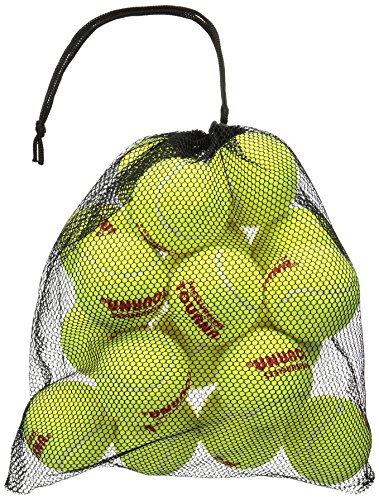 Tennis balls can also be used as an alternative to dryer sheets because they work as wool dryer balls. Some tennis balls are even covered with felted wool, while others are covered with felted nylon. But, they work very well to reduce static on clothes, helping to soften clothes, and dry them quicker. Like a dryer sheet or wool dryer ball, you just simply toss them into the dryer and be done.
Tennis balls can also be used as an alternative to dryer sheets because they work as wool dryer balls. Some tennis balls are even covered with felted wool, while others are covered with felted nylon. But, they work very well to reduce static on clothes, helping to soften clothes, and dry them quicker. Like a dryer sheet or wool dryer ball, you just simply toss them into the dryer and be done.
One of the benefits of using tennis balls is that you may already have some at home, so you won’t need to go out and spend extra money. Also, since they can be made of either wool or nylon, you can use the nylon versions if you or someone in your family has a wool allergy.
A con to using tennis balls is that if you don’t have them at home already, they can be more expensive than other forms of fabric softener. However, they can be reused repeatedly, so it may be a small price to pay compared to dryer sheets.
Another issue with using tennis balls is that they are heavy and have a rubber interior, so they bounce around a lot. Of course, this is necessary for their actual purpose, but it may not be ideal to use them in your dryer if it isn’t decided for heavy-duty use. In addition, the weight and impact of the tennis balls bouncing around could potentially cause damage to your dryer.
3. Vinegar
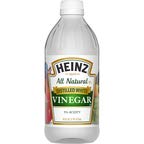 Vinegar can be used for several cleaning purposes, but you can also add fabric softener to the list of practical applications for vinegar. Since vinegar is a liquid, it is best used in the washing machine as a substitute for liquid fabric softener.
Vinegar can be used for several cleaning purposes, but you can also add fabric softener to the list of practical applications for vinegar. Since vinegar is a liquid, it is best used in the washing machine as a substitute for liquid fabric softener.
To use vinegar in the washing machine, all you have to do is add about 2 tablespoons to the fabric softener dispenser instead of the actual fabric softener. If your machine doesn’t have a dispenser, you should add it directly into the machine during the rinse cycle.
Perhaps one of the biggest benefits of using vinegar as a fabric softener is that it can serve a greater laundry purpose than just a fabric softener. The acidic properties of vinegar make it a great stain remover that can help to break down dirt and another residue on your clothes. It’s also good for preventing your colored clothes from fading in the wash.
Vinegar is also extremely affordable. You can get a whole gallon for as little as a couple of dollars. Considering the small amount that you put into the load, a gallon of vinegar should last you for a long time.
The only downside to using vinegar is that the initial smell is a little strong. However, it shouldn’t leave behind a smell on your clothes as long as you don’t use too much of it. If the clothes smell like vinegar when you take them out of the wash, try drying them first to see if the smell comes out before you wash them again.
4. Baking Soda
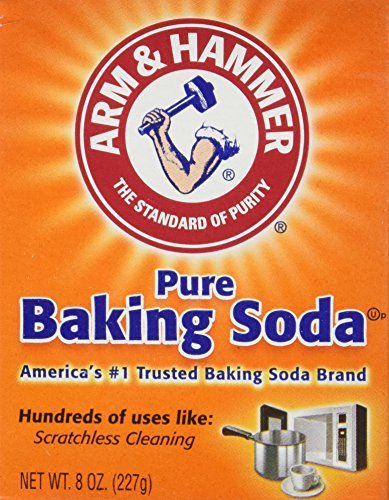 Baking soda is another one of those versatile cleaning products that everyone should have in their home. It is an effective substitute for a fabric softener that doesn’t contain any chemicals at all. Not only is baking soda an effective fabric softener, but it can also help get rid of odors from your clothes.
Baking soda is another one of those versatile cleaning products that everyone should have in their home. It is an effective substitute for a fabric softener that doesn’t contain any chemicals at all. Not only is baking soda an effective fabric softener, but it can also help get rid of odors from your clothes.
To use caking soda in your washing machine, you will want to let your washing machine fill up with water before tossing your clothes in. Add about ¼ to ½ cup (depending on the size of the load) directly into the water and let it dissolve. Once the baking soda has dissolved, you can add your clothes and let the washing machine do the rest.
The pros of using baking soda are that it is cheap. In some places, you can buy a small container of baking soda for as little as 50 cents. So if you don’t want to use your kitchen baking soda, you can just buy a separate container for your laundry room. Or, spring for a bigger box and it will last even longer.
There aren’t any downsides to using baking soda as a fabric softener other than the fact that it can get easily spilled or clumpy if it gets wet. One helpful suggestion is to pour it into an empty powdered detergent container or another type of container and use a scoop as a mess-free to get it out. It’s also a great way to recycle an empty container.
5. Epsom Salt
 Epsom salt is commonly used to soften your skin while taking a bath. It’s that reason that also makes it an effective fabric softener. You can use epsom salt in the washing machine by itself to soften clothes or combine it with baking soda to remove odors as well. Just add about ¼ cup to the washing machine.
Epsom salt is commonly used to soften your skin while taking a bath. It’s that reason that also makes it an effective fabric softener. You can use epsom salt in the washing machine by itself to soften clothes or combine it with baking soda to remove odors as well. Just add about ¼ cup to the washing machine.
The great thing about epsom salt is that it is very affordable. You can purchase large bags of it at the store for as little as a few dollars. And since epsom salt is such a popular bath product, you can now buy scented versions like lavender, for example, that can leave your clothes smelling fresh. You can also mix it with essential oils as well.
The downside to using epsom salt is that there are mixed opinions on whether or not it is potentially damaging to your washing machine. There are tons of recipes for DIY epsom salt fabric softener out there, but some people argue that it is damaging to the water. It’s good to do your own research before using this method.
6. Hair Conditioner
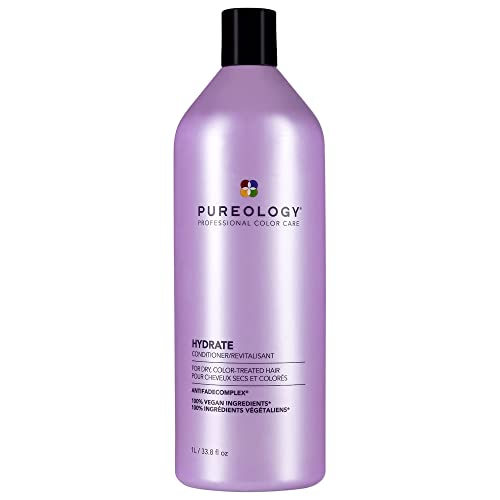 Just like hair conditioner can soften your hair, it can also soften your clothes as well. Using conditioner also has the added benefit of making your clothes smell as good as your hair does. You can use a hair conditioner in the washing machine, but you will need to combine it with vinegar and water first to dilute it.
Just like hair conditioner can soften your hair, it can also soften your clothes as well. Using conditioner also has the added benefit of making your clothes smell as good as your hair does. You can use a hair conditioner in the washing machine, but you will need to combine it with vinegar and water first to dilute it.
To do this, mix 2 cups of conditioner, 3 cups of vinegar, and 6 cups of water into a jar with a lid. Stir them gently to combine them. Then, you can add a couple of tablespoons to your fabric softener dispenser or the rinse cycle.
The good thing about this method is that you have many different options as far as scent goes. Plus, it is fairly easy to make and can last a while, depending on how much you use per load.
The bad thing is that some hair conditioners, especially cheap ones, can contain many chemicals. A hair conditioner that doesn’t contain many chemicals can be more expensive, so this may not be one of the cheaper methods on this list, depending on the type of conditioner you use.
7. Essential Oils
 Essential oils can be mixed with vinegar to achieve the softness and cleanliness that vinegar offers without the harsh smell. Just add about 3 teaspoons of your preferred essential oil to 2 cups of vinegar. Combine these ingredients in a spray bottle and spray it in the dryer before starting it.
Essential oils can be mixed with vinegar to achieve the softness and cleanliness that vinegar offers without the harsh smell. Just add about 3 teaspoons of your preferred essential oil to 2 cups of vinegar. Combine these ingredients in a spray bottle and spray it in the dryer before starting it.
The pro to using this method is that there are many different scents you can create. But the downside is that essential oils can be expensive if you don’t already have them, and this recipe calls for a significant amount of essential oil to reduce the vinegar smell.
8. Vegetable Glycerin
 Vegetable glycerin is the main ingredient in homemade lotion and soap, but it can also be used as a fabric softener for people who have sensitive skin. It is plant-based and all-natural, usually sourced from coconuts or soy. It can be purchased on Amazon or from a drug store. Just mix one part glycerin to two parts water in a jar with a lid and add a little bit to your washing machine load.
Vegetable glycerin is the main ingredient in homemade lotion and soap, but it can also be used as a fabric softener for people who have sensitive skin. It is plant-based and all-natural, usually sourced from coconuts or soy. It can be purchased on Amazon or from a drug store. Just mix one part glycerin to two parts water in a jar with a lid and add a little bit to your washing machine load.
The biggest pro to using glycerin as a fabric softener is that it is great for people who have sensitive skin because it is plant-based and doesn’t have an odor. However, being odorless is a disadvantage for people who want their clothes to smell good. You could add a few drops of essential oils to give it fragrance if you prefer.
9. Aluminum Foil
Aluminum foil may seem surprising, but it is an effective alternative to dryer balls. All you have to do is roll a piece up into a ball and throw it into the dryer. It will reduce static and help your clothes dry faster.
The benefit of using aluminum foil instead of a wool dryer ball is that aluminum foil is more affordable and won’t shed. It is also odorless, so it is a great option for people with allergies. However, aluminum foil can be noisy in the dryer, although it likely won’t make as much noise as a wool dryer ball or tennis ball would.
10. Eco-Friendly Fabric Softener
 If you’re unsure about the effectiveness of any of the methods mentioned so far, you can always opt for an eco-friendly fabric softener. These fabric softeners are natural alternatives that don’t contain as many harsh chemicals.
If you’re unsure about the effectiveness of any of the methods mentioned so far, you can always opt for an eco-friendly fabric softener. These fabric softeners are natural alternatives that don’t contain as many harsh chemicals.
A lot of eco-friendly fabric softener is plant-based or free from chemicals that are damaging to the environment. Some may also be fragranced, which could be both a pro and a con depending on whether or not you have allergies or sensitive skin. And like traditional fabric softener, eco-friendly versions may not be able to be used on all types of fabrics.
11. Soap Nuts
 Soap nuts are the dried hulls of the soapberry nut and are a great all-natural alternative to fabric softener that can also work as an eco-friendly laundry detergent. Soap nuts work by releasing the chemical saponin, which will soften your clothes.
Soap nuts are the dried hulls of the soapberry nut and are a great all-natural alternative to fabric softener that can also work as an eco-friendly laundry detergent. Soap nuts work by releasing the chemical saponin, which will soften your clothes.
To use soap nuts, just put a few into the bag that comes with them and wash your clothes as you normally would. Then, remove the soap nuts from the load before you put the clothes into the dryer.
Soap nuts can be purchased on Amazon. They can be a little expensive, but each soap nut can be reused several times, so one package of them should last you a while.
12. Reusable Dryer Balls
 The last option for eco-friendly alternatives to fabric softener is reusable dryer balls. These are different from the wool dryer balls mentioned earlier because they are made from plastic. But, they still soften clothes and reduce static and drying time.
The last option for eco-friendly alternatives to fabric softener is reusable dryer balls. These are different from the wool dryer balls mentioned earlier because they are made from plastic. But, they still soften clothes and reduce static and drying time.
They can be used over and over again. And unlike wool dryer balls, they won’t shed over time, making them a great option for people with allergies.
Considering that they will last you years, reusable dryer balls are extremely affordable and aren’t wasteful. The only downside that some people might find is that there isn’t a way to add fragrance to them.
Conclusion
If you’re wanting to start using fabric softener but are concerned about the negative effects of it, or you just want to make a switch to a more eco-friendly alternative, I hope this article has given you plenty of ideas.
There are certainly pros and cons to each of these methods, but they are all better for yourself and the environment than traditional laundry detergents, so hopefully you can find one that works well for you. Thanks for reading!